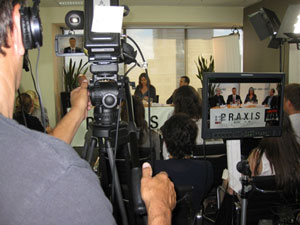Praxis opens up the development debate to civil society, government and the public so they can participate and contribute to the issues that most affect them. Photo: Aleta Moriarty, World Bank
Australia is a middle-sized and influential donor, particularly in the Pacific and East Asia, with growing development assistance programs in Africa, the Middle East, and South and West Asia. But there are limits to what it can achieve alone.
The policy framework for Australia's aid program, An effective aid program for Australia, acknowledges that multilateral organisations are vital partners in the fight against poverty. Investing aid funds through organisations such as the World Bank Group [external website] means Australia benefits from their specialist expertise and can significantly increase both the geographical reach and the impact of its aid program in a cost-effective and efficient way.
Similarly, the World Bank works with Australia to take advantage of Australia's experience and skills, including in working with small and fragile states and technical expertise in key sectors such as water, dryland farming, mining and food security.
The 2012 Australian Multilateral Assessment, which assessed the effectiveness of 42 international development organisations, confirmed that the World Bank is a highly effective development partner. The World Bank was rated as one of the top five multilateral organisations with which Australia works and received strong scores in delivering results, its relevance in the wider development system and organisation performance.
As the Australian aid program continues to grow to meet its target of 0.5 percent of gross national income by 2016–17, the World Bank Group will continue to be an important development partner.
Opening up development debate and sharing knowledge
An Australian and World Bank initiative is Praxis, a monthly televised panel discussion on development issues and policy, which was launched in April 2011. This award-winning series gets both experts (including from AusAID and the World Bank) and the public involved in serious, unedited discussion on some of the big development issues facing the Asia–Pacific region. The series is distributed to eight broadcast outlets across five countries and uploaded to YouTube and Kaltura. It attracts a live public and civil society audience every month across Australia, East Timor, Solomon Islands, and Papua New Guinea, giving the audience opportunities to pose questions to experts on the issues that matter most to them.

